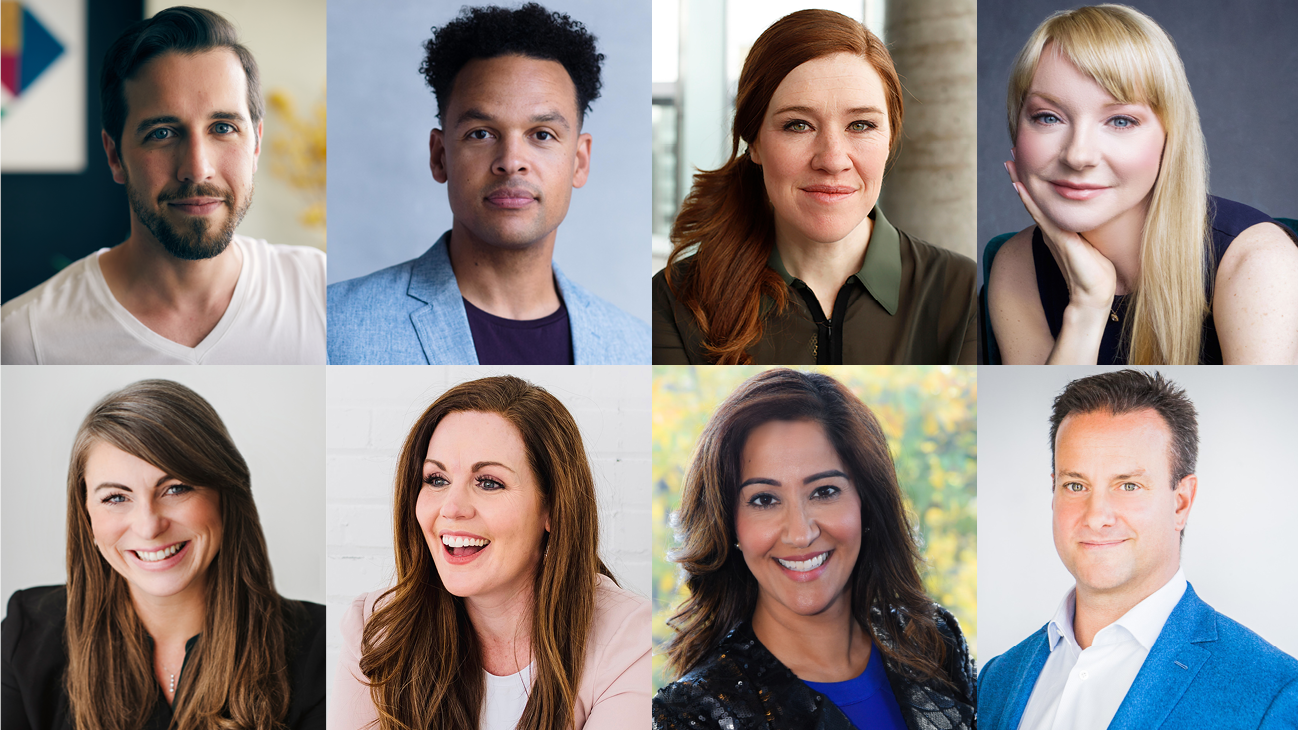Bell Let’s Talk Day emphasizes the importance of talking about mental health to break the stigma that surrounds it and create a safe space to support each other.
Over the course of the pandemic, we’ve hosted a Virtual Speakers Series to stay connected with our community of clients and speakers during this difficult time, with several events focusing on the topics of mental health, wellness, resiliency, and burnout.
Often the most popular and impactful sessions, these events saw our speakers share their personal mental health journeys as well as strategies to prioritize and maintain our mental well-being in times of crisis and beyond. It certainly provided us with the support and resources we needed and we hope they do the same for you.
Mental Health
Understanding Mental Health: The Good, the Bad, and the Funny with Jessica Holmes
“Depression makes you feel like the little fishbowl of muck that you are stuck in in that moment, it feels like that is your permanent life system. You don’t have the ability to have the optimism to see that it could ever be better, so why even try?”
Jessica Holmes has been a celebrity ambassador with the Bell Let’s Talk campaign since 2018 — the same year she released her bestselling memoir Depression the Comedy: A Tale of Perseverance.
In Jessica’s line of work, tragedy + time = comedy. With the humour she’s known for, Jessica shares her personal stories to help end the stigma around mental health issues. She walked us through the darkest time of her life and showed us how, through comedy and following simple, sustainable strategies, she was able to build resiliency and learn to prioritize her mental health on a daily basis.
The Intersection of Mental Health and Anti-Racism with Anthony McLean
“I still have these ghosts of living in a world that looks at me like I’m a criminal. That looks at me like I’m up to something. It’s like this tension, like this anxiety, like waiting to exhale. For me, this is the intersection of mental health and racism and the impact racism has on BIPOC people.”
Working within both mental health and anti-racism, Anthony McLean lives in the overlap between mental wellness and racial equity.
Drawing from his personal experiences of stereotyping and racism, Anthony walked us through exactly how these experiences reinforce feelings of paranoia and anxiety in day-to-day life to illustrate the impact of systemic racism on mental health. He also showed why empathy is integral to approaching mental health and DEI (diversity, equity, and inclusion) and shared tips on how we can all become more empathetic listeners:
- Don’t minimize someone’s experience — what they felt is how they felt, don’t replace their emotional response with your own.
- Don’t give advice in a moment of frustration, trauma, or grief, even if it comes from a place of support.
- Don’t center the conversation on yourself.
- Don’t gaslight the other person — be careful not to make the person sharing their experience question their perception of that experience.
Finding Our Path to Mental Health with Clara Hughes and Mark Henick
In a special joint presentation, Olympian Clara Hughes and mental health advocate Mark Henick shared their mental health journeys, offering their support and advice to help others find their path to healing as well.
Clara, a six-time Olympic medalist, spoke of how her self-destructive behaviour and addiction as a teenager with childhood trauma, led her to develop an addiction to winning that spiraled her deeper into addiction, loneliness, and depression. Through the support of her fellow athletes, she finally met with a mental health professional and found the help she needed to heal.
Clara emphasized the importance of taking stock of our daily challenges and our mental well-being, especially during this difficult time. “I think it is so important in this moment to go to the slower, lower, gentler place. Empathy and compassion, for others and ourselves,” she said.
Mark struggled with depression and anxiety throughout his childhood. He made several attempts to commit suicide, until one night, on the edge of an overpass ready to jump, a stranger saved his life. Afraid that everyone would learn of his “deep, dark secret”, he instead found the safety, help, and support that he was desperately seeking. Through opening up about his struggles, he was able to start learning how to cope with his depression and anxiety.
Adaptability, Mental Health, and Connection During Times of Stress with Dr. Shimi Kang
With 20 years of clinical experience, Dr. Shimi Kang gave an informative session on understanding the neurological causes of stress and anxiety, and how we can improve our ability to adapt during turbulent times and better our mental health.
Stress automatically puts us in survival mode, where we are more prone to anxiety, irritability, and distraction. While natural, Shimi said, we need to learn how to control these impulses and return our brain back into “growth” mode. We can do this through:
- Healthy connection with others.
- Incorporating “play” into our lives — how we learn to experiment, imagine, and challenge ourselves to overcome obstacles.
- Making a conscientious effort to have downtime, both to combat stress and build our mental reserves for difficult moments.
Wellness
Preventing a Burnout Epidemic with Jennifer Moss
In 2019, the World Health Organization added burnout to its classification of diseases, calling it an occupational phenomenon. While on the radar for years, burnout was brought to a crescendo during the pandemic.
Jennifer Moss, the bestselling author of The Burnout Epidemic, took us on a deep dive into the dangers of burnout and its root causes, and how we can all work to prevent it.
It is a result of unmanaged stress at work caused by unsustainable workloads, perceived lack of control, insufficient rewards for effort, lack of a supportive community, lack of fairness, and mismatched values and skills.
There are many ways to counteract burnout, with Jennifer making several suggestions about what we can do today to better position ourselves both at home and work, including:
- Management teams being more flexibility with their expectations, shifting the focus from the amount of hours worked from week to week to achieving specific goals.
- Being aware of screen time and prioritizing screen breaks, like scheduling daily walks, lunches away from the computer, etc.
- Learning how to community with empathy. Scheduling regular check-ins with colleagues and employees and adjusting workloads as needed.
Stress and Performance: Body and Mind Work with Dr. Robyne Hanley-Dafoe and Dr. Greg Wells
Resiliency expert Dr. Robyne Hanley-Dafoe and health and performance expert Dr. Greg Wells combined their complimentary expertise to offer strategies on protecting and enhancing both our physical and mental health, especially during challenging times.
Greg spoke to neurophysiology, providing insight into the scientific elements at play between our different shifting states of mind, while Robyne came from the psychological realm of science, focusing on everyday resiliency and combatting the rising rates of burnout and compassion fatigue.
They both spoke to the importance of resiliency, not just in overcoming isolated events or crises, but in learning how to be adaptive and flexible in the face of any challenge. Greg emphasized the importance of finding our middle ground between well-being and thriving.
Check out Robyne’s solo event on Everyday Resiliency as well as Greg’s on Optimizing Health and Performance.
Interested in learning more about our speakers on mental health and workplace wellness? Email us at [email protected].




